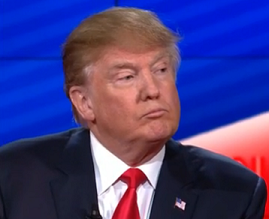Trump Willing to Close Down Parts of Internet

The smarter way to stay on top of broadcasting and cable industry. Sign up below
You are now subscribed
Your newsletter sign-up was successful
Cybersecurity, encryption back doors and even closing down portions of the Internet all got major attention from Republican presidential candidates at the CNN debate in Las Vegas.
Leading candidate Donald Trump doubled down on comments that he would be willing to close down portions of the Internet if it meant preventing ISIS from using the Web and social media sites. He said Silicon Valley and others should be enlisted to find a way to do that.
Ohio Governor John Kasich said he did not agree with the approach. Rand Paul said that if Donald Trump wants to close the Internet, it means getting rid of the First Amendment and people should realize that is what he is asking for.
Trump said he was not talking about closing the Internet, but instead getting "our people" to infiltrate "their" Internet.
There was also some back and forth about the need for creating backdoors to encrypted communications for law enforcement in special circumstances, something the Obama Administration supports.
But Sen Ted Cruz (R-Tex.) said that while the White House was willing to monitor cell phones and e-mails, the Department of Homeland Security, because of misplaced political correctness and not wanting to focus on "the bad guys," was unwilling to monitor the social media posts of terrorists.
Asked if the private sector should be forced to help gather info on terrorists, Carly Fiorina, former head of HP, said not forced, but asked.
The smarter way to stay on top of broadcasting and cable industry. Sign up below
In a follow-up interview with CNN, Trump spokeswoman Katrina Pierson said that her candidate was simply talking about coming up with an extra layer of security and monitoring of the 'net to prevent terrorists from using it to spread their propaganda in the U.S.
She also called it "just and idea" he wanted to explore with the "best and brightest" computer minds, like Microsoft's Bill Gates.
Contributing editor John Eggerton has been an editor and/or writer on media regulation, legislation and policy for over four decades, including covering the FCC, FTC, Congress, the major media trade associations, and the federal courts. In addition to Multichannel News and Broadcasting + Cable, his work has appeared in Radio World, TV Technology, TV Fax, This Week in Consumer Electronics, Variety and the Encyclopedia Britannica.

